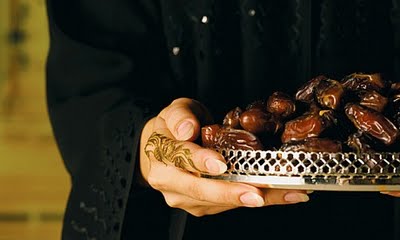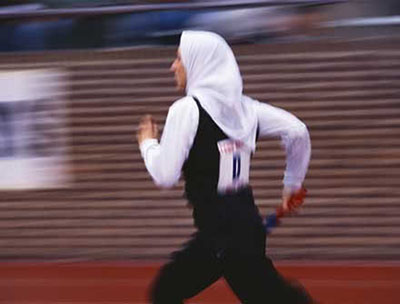
Source: islam.rosegalaxy.com
The month of Ramadhan [is that] in which was revealed the Qur’an, a guidance for the people and clear proofs of guidance and criterion. So whoever sights [the new moon of] the month, let him fast it; and whoever is ill or on a journey – then an equal number of other days. Allah intends for you ease and does not intend for you hardship and [wants] for you to complete the period and to glorify Allah for that [to] which He has guided you; and perhaps you will be grateful.1
(Al-Baqarah: 185)
Sya’ban is almost ending, opening a new chapter of the most anticipated month in Muslim lunar calender – Ramadhan. The month of Ramadhan is considered one of the holy months for Muslim. During Ramadhan, Muslim are expected to go through a holistic inside-out transformation not only spiritually but also physically. One of the mechanism to ensure and promote this process is fasting from morning twilight (Fajr Prayer) to the evening twilight (Maghrib Prayer). The term Ramadhan is literally driven from al-Ramd which means ‘burning heat of the sun’2.
Muslim are expected to observe fasting by not inserting anything into the body lumen or opening, namely mouth, nostril, earhole, anus, vagina or penis. Foods & fluids are only allowed at night as fasting extends from dawn to sunset. The exact length of time depending on geographical location and season – country with season. Roughly Malaysian Muslim will observe their obligation for about 14 hours.
Reason of fasting
To obtain ‘self-restraint’ as reflected in the holy Qur’an:
“O you who believe! Fasting is prescribed for you as it was prescribed for those before you, that you may observe self-restraint (al-Taqwa).”3
[Al-Baqarah:183]
The most sincere worshipping of God. Fasting is like a perfume kept in its container. Once the lid is opened the fragrance hovers and only its tasteless liquid remains. The best worshipping is the most secret of all. Once its seal is broken it may be spoiled by showing off. All other types of worshipping are prone to show off. Prayer, which is meant to be offered in a group for its public nature is prone to showing off and hence can be easily void. Pilgrimage of hajj is even more prone to showing off. Fasting, however, is the only platform that none other than God would really know if you are fasting. Fasting is an inner worshipping and hence it can be the most sincere worshipping.4
Is fasting healthy?
The body enters into a fasting mode eight hours or so after the last meal, when the gut finishes absorption of nutrients from the food. In the normal mode, body glucose, which is stored in the liver and muscles, is the body’s main source of energy.
During a fast, this store of glucose is used up first to provide energy. Later in the fast, once the stores of glucose run out, fat becomes the next store source of energy for the body. Only with a prolonged fast of many days to weeks does the body eventually turn to protein for energy. This is the technical description of what is commonly known as ‘starvation’, and it is clearly unhealthy.
As the Ramadan fast only extends from dawn until dusk, there is ample opportunity to replenish energy stores at pre-dawn and dusk meals. This provides a progressive and gentle transition from glucose to fat as the main source of energy, thereby preventing the breakdown of muscle for protein.
To prevent muscle breakdown, meals must contain adequate levels of ‘energy food’, such as carbohydrates and some fat. Hence, a balanced diet with adequate quantities of nutrients, salts and water is vital. Balanced food and fluid intake is important between fasts. The kidney is very efficient at maintaining the body’s water and salts, such as sodium and potassium. However, these can be lost through sweating.5
Don’t skip Sahur (pre-dawn meal) !
Even though the thought of sleep may be far more appealing than waking up to force down some food, don’t skip Sahur. It is the most important meal of the day and during Ramadan – it’s the meal that will sustain you for the next few hours.
Commonly foods consumed by Prophet Muhammad (PBUH)
Milk, dates, lamb/mutton and oats were among the Prophet’s (PBUH) dish.
Why is hydration so critical during the month of Ramadan?
Making sure that your body is getting enough water is important in order to prevent dehydration – which is a common occurrence during Ramadan. Water is a cheap, healthy, readily available drink that is vital for many functions in our body. Keep in mind that your body loses water and salts through sweat, urine and breathing. Also, water loss depends on how physically active you are throughout the day. The weather can also affect your hydration status. Therefore, replenishing water losses before the fast is important in order to prevent common symptoms of dehydration: dizziness, fatigue, headaches, muscle cramps and disorientation. Simply put; good hydration during Ramadan is vital to replenish water losses and is a prevention method from the many symptoms of dehydration.6
‘Good’ & ‘Bad’ foods during Ramadan
During Ramadan you need to put extra effort into incorporating foods from all five food groups to ensure variety and a well-balanced diet. However, the golden rule of nutrition still applies, portion size needs to be observed & moderation should be practiced although it is group as ‘Good Food’.7
‘Good Food’
- Rice,breads, cereals and other grain products
- fruit and vegetables
- meat, fish and poultry
- milk, cheese and yoghurt
- fats and sugars (these contain very little nutrients and are high in calories and therefore their intake should be limited).
Complex carbohydrates (Look out for foods labeled Low G.I.)
- foods that will help release energy slowly during the long hours of fasting
- Found in grains and seeds like barley, wheat, oats, beans, lentils, wholemeal flour basmati rice.
Fibre-rich foods are also digested slowly and include bran, cereals, whole wheat, grains and seeds, potatoes with skin, vegetables such as green beans and almost all fruit, including apricots, prunes and figs.
‘Bad Food’
- heavily processed
- refined carbohydrates: sugar and white flour
- fatty food like cakes, biscuits, chocolates, sweets.
- It may also be worth avoiding the caffeine content in drinks (caffeine is a diuretic and stimulates faster water loss through urination).
What foods should I eat at Sahur and Iftar?
Sahur
The pre-dawn meal should be a wholesome, moderate meal that is filling and provides enough energy for many hours. It is therefore particularly important to include slowly-digesting foods like complex carbohydrates. Drink fluids to keep you hydrated during the day and assist with digestion.
Iftar
The meal that breaks the day’s fast could include dates, following the Prophetic traditions. Dates will provide a refreshing burst of much-needed energy. Fruit juices will also have a similar, revitalising effect. The meal should remain a meal and not becoming an overly gorging period.
How important is it to watch our intake of salt during Ramadan?
A high concentration of salt (sodium) and a low volume of water will usually trigger thirst. Sodium is vital for fluid balance in our body since water goes where sodium goes. A high intake of sodium is usually excreted by the kidneys so water is also lost. A high salt intake will also affect people will high blood pressure problems so it is important to avoid foods that have a high salt content such as processed meats, canned products, pickles and salted food (eg: salted fish).

Source: muslimvillage.com
Can I continue exercising during Ramadan?
Yes, keep it up! People tend to become more sedentary during Ramadan due to lack of energy during the day and being more caught up with social events throughout the evening. Working out at a time where your energy levels are high and rehydration is possible can guarantee a “good workout” where your performance is not affected. Therefore, 2-3 hours after Iftar can be an ideal time to exercise or engage in some sort of activity. Engaging in high intense sports/activities during the day is unadvisable as it could increase the risk of dehydration. If you do decide to work out while fasting, then about an hour before Iftar would be advisable as that gives you a short amount of time until you will have to rehydrate and replace water losses after exercise. Also, you will be able to replenish your energy stores and help with muscle recovery quicker.8
Is our metabolism affected during Ramadan?
In order to answer that, you will need to know what metabolism really is. Metabolism can be defined as all the chemical processes that go on in your body to keep you alive. Metabolism turns the fuel from the foods we eat into energy to power these chemical processes. During a fast or when calories are restricted, a lowering in the BMR or basal metabolic rate occurs. BMR is the minimal amount of energy/calories required at rest or basically to stay alive. Your body’s efficiency with using calories and nutrients increases the longer you fast therefore, your metabolism slows down.
What if I’m unwell during Ramadan?
Ramadan fasting is obligatory for the healthy adult but when fasting may significantly affect the health of the fasting individual or when one is genuinely sick, Islam exempts them from fasting as mention in the frist Quranic verses above.
“God intends every facility for you, he does not want to put you into difficulties”1 (Al-Baqarah: 185)
Because taking pills and medications is considered as breaking the fast, people on regular medicines should discuss this with their doctor or pharmacist. If necessary, it is possible to make up missed fasting days at a later date. Fasting is not recommended for pregnant women in their second or third trimester or children under the age of nine.
Quick tips
- Eat normal sized, nutritious meals at Sahoor and Iftar.
- Avoid foods high in fat, salt and sugar.
- Choose a diet rich in fruit, vegetable, beans, lentils rice and grains.
- Drink plenty of fluids and avoid caffeinated beverages like coffee, tea, energy drinks or cola.
- Break the fast with a healthy snack like dates – a nutritious burst of natural sugar.
- Speak to a health professional before changing medication regimes for Ramadan.
- Avoid excessive exercise during fasting times – if you want to go to the gym, consider doing so after Iftar.
Fasting is about increasing awareness, savouring the food you eat and appreciating God, not an excuse to overeat. Once you know what is the benefit of fasting is, you can do the fasting properly. The important thing in fasting is how to be close to God. If you want to be close to someone, you have to build a relationship. A healthy relationship with food, is just one way to keep physically and spiritually fit. The key is variety, frequency and portions.
Bottom line is, eating healthy during Ramadan is not impossible even when sweets, desserts and common dishes only served during the holy month make an appearance on your dining tables. There’s always a way to modify such meals or to have control over how often they are served.! Ramadan Kareem!
Ahmad Fairus Ramli graduated from the International Islamic University Malaysia and is currently a dietician in a government hospital in Johor.
References:
- http://quran.com/2/185
- Al-Raghib al-Isfahani, al-Mufradat.
- http://quran.com/2/183
- http://www.al-islam.org/fasting-and-ramadhan-sheikh-mansour-leghaei/ramadhan-awareness
- http://www.rmit.edu.au/students/health/ramadan
- http://nutrition-az.com/2012/07/24/healthy-fasting-the-ramadan-guide/
- Medical Nutrition Therephy Guidelines for Type 2 Diabetes Mellitus, Second Edition
- http://www.theguardian.com/lifeandstyle/2007/sep/18/healthandwellbeing.features11
[This article belongs to The Malaysian Medical Gazette. Any republication (online or offline) without written permission from The Malaysian Medical Gazette is prohibited.]
